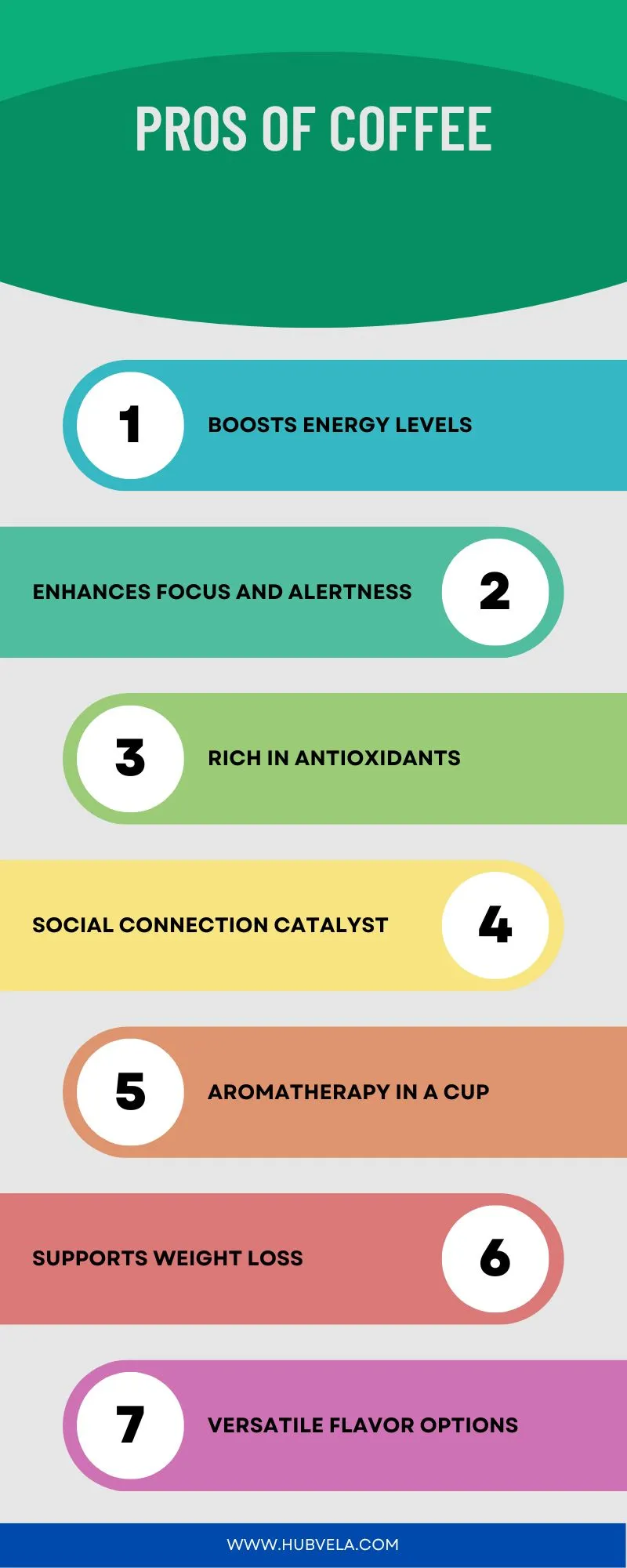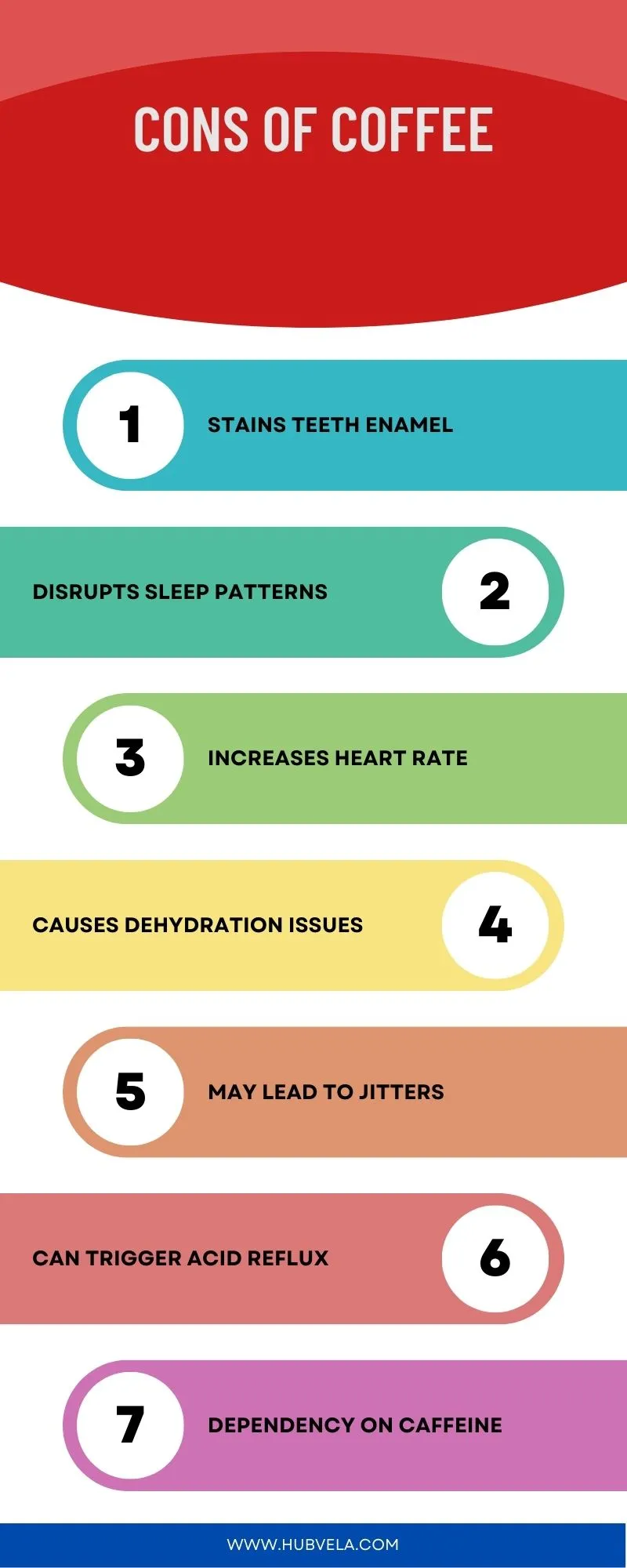Coffee, a beloved beverage enjoyed by millions around the world, has been a subject of debate when it comes to its potential health benefits and drawbacks.
In this article, we will explore various pros and cons of coffee consumption. Whether you’re a dedicated coffee enthusiast or someone looking to make informed choices about your daily caffeine intake, understanding the pros and cons of coffee is essential for maintaining a balanced and healthy lifestyle.
Let’s take a closer look at the science behind coffee and uncover the facts that can help you make well-informed decisions about your coffee consumption.

--Advertisement--
Pros of Coffee
Steaming from a rich history that spans centuries, coffee has evolved into more than just a beverage; it’s an integral part of daily routines worldwide.
As one of humanity’s most beloved stimulants, this aromatic brew offers far-reaching benefits beyond its invigorating effects. We will explore numerous pros associated with consuming coffee—a timeless elixir that continues to captivate our senses and improve our lives in various ways.

1. Boosts Energy Levels
Invigorate your mornings with a steaming cup of this popular beverage, known for its ability to enhance alertness and productivity throughout the day. Coffee contains caffeine, a natural stimulant that quickly absorbs into your bloodstream, blocking adenosine, a neurotransmitter responsible for making you feel tired.
This leads to increased neuron firing and the release of other neurotransmitters like dopamine and norepinephrine, which elevate your mood and cognitive function. The energy boost from coffee can help you power through tasks, stay focused, and combat feelings of fatigue.
Studies suggest that moderate coffee consumption can improve physical performance, making it a go-to choice for athletes and fitness enthusiasts looking for that extra edge during workouts.
2. Enhances Focus and Alertness
Boosting your mental acuity and sharpness, coffee is renowned for its ability to heighten focus and alertness throughout the day. By blocking adenosine, a neurotransmitter responsible for promoting sleep and relaxation, coffee keeps you feeling more awake and attentive.
The caffeine in coffee also increases the release of neurotransmitters like dopamine and norepinephrine, enhancing neuron firing in the brain. This heightened brain activity leads to improved focus, concentration, and overall cognitive function.
Whether you need to power through a work project, study for an exam, or simply stay alert during a busy day, a cup of coffee can provide the mental boost you need to stay sharp and focused.
3. Rich in Antioxidants
Indulging in a cup of this popular beverage can provide you with a boost of antioxidants, which are beneficial for your overall health and well-being. Antioxidants help combat oxidative stress in your body by neutralizing free radicals, which can contribute to various diseases and aging.
Coffee is a rich source of polyphenols, a type of antioxidant that has been linked to reduced inflammation and improved heart health. By incorporating coffee into your daily routine, you can increase your antioxidant intake and potentially lower your risk of chronic conditions such as heart disease, cancer, and diabetes.
4. Social Connection Catalyst
Coffee serves as a catalyst for social connections, fostering interactions and bonding among individuals in various settings. Whether catching up with a friend at a local cafe or attending a work meeting over a cup of coffee, this beloved beverage often acts as a facilitator for meaningful conversations and relationship-building.
The act of sharing a coffee break with someone can create a relaxed atmosphere where people feel more comfortable opening up and connecting on a personal level.
Coffee shops serve as popular meeting spots for dates, study groups, or casual gatherings, providing a neutral ground for individuals to come together and engage in enriching social interactions.
5. Aromatherapy in a Cup
Sipping on a freshly brewed cup of coffee can transport you to a world of delightful aromas and invigorating flavors, enhancing your sensory experience and providing a moment of comfort and relaxation.
The rich aroma of coffee beans can awaken your senses, creating a soothing atmosphere that calms your mind and uplifts your spirit.
The scent of coffee is known to reduce stress and anxiety, promoting a sense of well-being and tranquility. These aromatic compounds in coffee have been linked to improved mood and increased alertness.
With each sip, you can immerse yourself in a fragrant escape, indulging in the therapeutic benefits of coffee’s enticing aroma.
6. Supports Weight Loss
Enhance your weight loss journey with the support of coffee’s metabolism-boosting properties. Coffee contains caffeine, a natural stimulant that can increase your metabolic rate, aiding in burning more calories throughout the day.
By boosting your metabolism, coffee can help you burn fat more efficiently when combined with a healthy diet and regular exercise. Caffeine can also enhance physical performance, allowing you to push yourself harder during workouts and potentially burn more calories.
Incorporating coffee into your routine in moderation can be a helpful tool in your weight loss efforts. Remember, balance is key, so be mindful of your overall caffeine intake and avoid excessive amounts that could lead to negative side effects.
7. Versatile Flavor Options
Indulge in a myriad of delightful flavor options that cater to every palate when enjoying your daily cup of coffee. Whether you prefer a bold and robust brew or a smooth and mellow flavor, coffee offers a vast array of choices to suit your taste preferences.
From rich and chocolatey mochas to creamy and sweet caramel lattes, there’s a flavor profile for everyone to enjoy. You can explore different origins and roast levels to experience unique tasting notes ranging from fruity and floral to nutty and spicy.
With the ability to customize your coffee with various syrups, spices, or dairy alternatives, the possibilities are endless. Embrace the versatility of coffee and savor a new flavor adventure with each cup.
Cons of Coffee
For centuries, coffee has been a cherished beverage that fuels our mornings, energizes us through long workdays, and brings people together in social settings worldwide.
However, while its invigorating effects are undeniable, it’s essential to consider both sides of this beloved brew—the cons of coffee alongside its benefits. We explore potential drawbacks associated with consuming caffeine-rich drinks like coffee.

1. Stains Teeth Enamel
Consuming coffee regularly can lead to the discoloration of your tooth enamel, affecting the brightness of your smile. The dark pigments in coffee, such as tannins, can gradually build up on the surface of your teeth, causing them to appear yellow or stained over time.
Despite brushing your teeth regularly, these stains can be stubborn and may require professional whitening treatments to remove.
It’s essential to be mindful of this potential effect of coffee on your teeth and consider ways to minimize staining, such as drinking water alongside your coffee or using a straw to reduce direct contact with your enamel.
Taking proactive steps can help you maintain a brighter smile while still enjoying your favorite brew.
2. Disrupts Sleep Patterns
Regularly drinking coffee can disrupt your sleep patterns, impacting the quality and duration of your rest. The caffeine in coffee is a stimulant that works by blocking the effects of adenosine, a brain chemical involved in sleep.
Consuming coffee, especially in the afternoon or evening, can interfere with your body’s natural sleep-wake cycle, making it harder to fall asleep and potentially reducing the overall amount of restorative sleep you get.
Even if you manage to fall asleep after drinking coffee, the quality of your sleep may be compromised, leading to lighter and more fragmented sleep.
To ensure better sleep hygiene, consider limiting your coffee intake, especially later in the day, to promote healthier and more restful sleep.
3. Increases Heart Rate
Disrupting your sleep patterns isn’t the only downside to your coffee habit; another con is that it can increase your heart rate.
When you consume coffee, the caffeine present in it acts as a stimulant. This stimulant effect can lead to a temporary increase in your heart rate.
For some individuals, especially those sensitive to caffeine or those with certain heart conditions, this heightened heart rate can be concerning.
Prolonged elevated heart rates due to excessive coffee consumption may not be suitable for your cardiovascular health in the long run.
It’s essential to be mindful of how your body reacts to caffeine and monitor your heart rate to ensure you’re not putting unnecessary strain on your heart.
4. Causes Dehydration Issues
Excessive coffee consumption can lead to dehydration issues, impacting your body’s overall hydration levels. Coffee is a diuretic, meaning it increases urine production, which can result in fluid loss and potential dehydration.
When you drink coffee, your body may expel more water than it takes in, leading to a negative fluid balance. Dehydration can cause symptoms such as dry mouth, decreased urine output, dark-colored urine, and even dizziness.
To counteract the dehydrating effects of coffee, it’s essential to drink plenty of water throughout the day. Be mindful of your coffee intake, especially in hot weather or during intense physical activity, to prevent dehydration and maintain proper hydration levels for optimal bodily functions.
5. May Lead to Jitters
Drinking coffee in large quantities can often lead to feelings of jitteriness and restlessness. The high caffeine content in coffee stimulates your central nervous system, causing an increase in adrenaline levels.
This surge can result in symptoms like shakiness, nervousness, and a racing heart. Jitters typically occur when you consume more coffee than your body can handle, causing an overstimulation effect.
It’s essential to be mindful of your caffeine intake to prevent these uncomfortable sensations. To minimize jitters, try opting for decaffeinated options or reducing your overall coffee consumption.
Being aware of how coffee affects your body and moderating your intake can help you avoid the jittery side effects associated with excessive coffee consumption.
6. Can Trigger Acid Reflux
When consumed in excess, coffee can exacerbate acid reflux symptoms due to its acidic nature, potentially causing discomfort and irritation in the esophagus.
The high acidity of coffee can relax the esophageal sphincter, allowing stomach acid to flow back up into the esophagus, leading to a burning sensation commonly known as heartburn.
This can be particularly troublesome for individuals who already suffer from acid reflux or gastroesophageal reflux disease (GERD).
If you experience frequent heartburn or acid indigestion, it may be beneficial to limit your coffee intake or opt for lower-acid options.
Making these adjustments could help alleviate the discomfort caused by acid reflux and improve your overall digestive health.
7. Dependency on Caffeine
Depending on caffeine for energy can lead to a reliance on coffee, which may result in withdrawal symptoms when consumption is reduced or stopped.
This dependency can develop over time as your body becomes accustomed to the regular intake of caffeine. When you consume coffee consistently to boost your energy levels, your body may start to rely on it to function normally.
As a result, cutting back on caffeine or trying to quit suddenly can lead to unpleasant side effects such as headaches, fatigue, irritability, and difficulty concentrating.
This reliance on coffee can create a cycle where you need more caffeine to feel awake and alert, perpetuating the dependency. It’s essential to be mindful of your caffeine intake to avoid becoming overly dependent on coffee for energy.
Conclusion on Pros and Cons of Coffee
Overall, coffee can be a great pick-me-up with its energizing effects and potential health benefits. However, it’s important to be mindful of its potential downsides such as increased heart rate and potential dependency.
Moderation is key when it comes to enjoying this popular beverage. So, go ahead and savor your morning cup of coffee, but remember to listen to your body and consume it in moderation for the best results.


